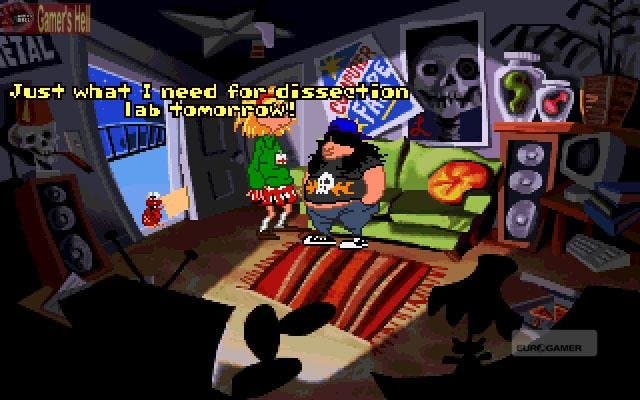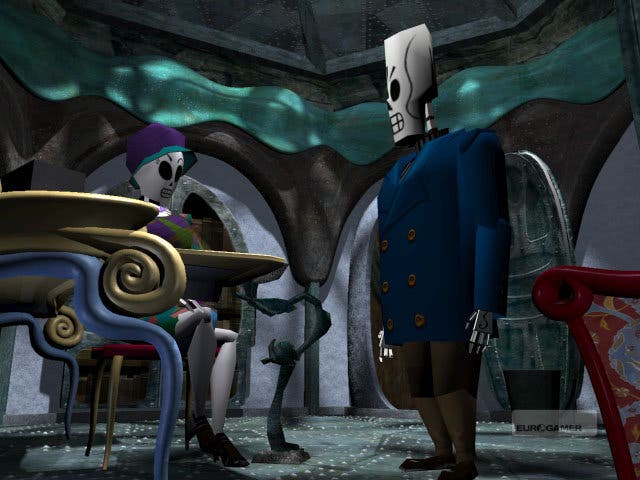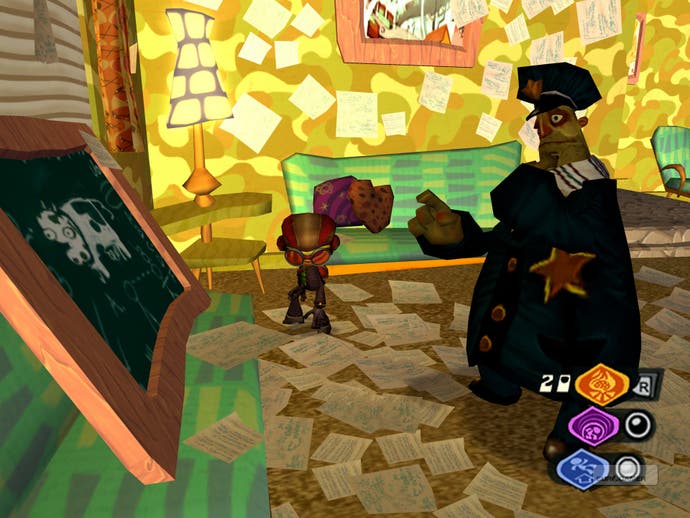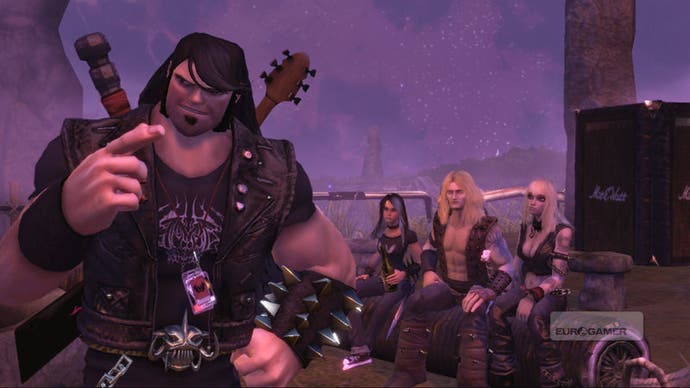The Kickstarter Conundrum
Double Fine's success story could be one that's unlikely to be repeated.
"It seems like this little project could have an impact beyond itself". So said Tim Schafer's understandably shell-shocked post on Double Fine's Kickstarter page as the money pledged towards the studio's crowd sourced adventure game sailed past its $400,000 target in less than eight hours.
At the time of writing, that total has now passed $1.7m. By the time the campaign finishes in a month's time, who knows how much more will have been raised? It's safe to say that the gamble has paid off better than anyone dreamed.
Inevitably, we're now seeing other developers flirting with the idea of crowdsourcing their next project and no doubt there are many eager young start-up studios hooting with glee at the idea that the publishing dinosaurs have had their ivory towers of their house of cards shaken by an earthquake of grass roots activism, ready to collapse in a soggy pile of mixed metaphors.
Are we really witnessing the dawn of a new age of utopian game funding? Or is Double Fine's incredible success more noise than data, an erroneous spike in the norm brought about by a unique confluence of circumstances?

While the model for indie gaming is undoubtedly changing, I tend towards the latter view. Using Double Fine's jackpot as a baseline for future development is problematic as so much of this situation only works for Double Fine.
For one thing, Double Fine has fans. Lots of them. And by 'fans' I don't just mean 'people who liked their last game'. To invest their money, people need to be passionate about a studio, and more importantly they need to trust it. Don't forget - we still know nothing about Double Fine's proposed project. There's no title, no synopsis. People are abstractly pledging their money to the company, not to the project itself, because they love Double Fine.
And yet there's no such thing as a typical Double Fine game, which makes the prospective adventure game project even more vague and, somehow, more exciting. How many developers could get people to buy games as diverse and ambitious as Brütal Legend, Stacking, Iron Brigade and Sesame Street? Very few. Fans trust Double Fine, and they're happy to pay up front, safe in the knowledge that whatever comes out at the other end will be interesting and unique and worth every penny.
But we can't ignore the fact that these are fans that have been built up thanks to great games funded and published through traditional channels. Film director Kevin Smith made a big noise about how he was changing the Hollywood paradigm when he self-distributed his horror movie Red State, making his money back by charging fans to attend special one-off screenings with him as host. What he failed to acknowledge was that his model only worked thanks to his large, enthusiastic existing fanbase, ready and willing to support him in any endeavour. Double Fine clearly has that fanbase. Others - many, many others - do not.
A case in point: Robomodo, the developer behind the critically mauled Tony Hawk: Ride, tried to raise money on Kickstarter for a XBLA Kinect pinball game but struggled to raise more than $5,000. Why? Because people don't have an emotional connection with Robomodo. Or, if they do, it's likely to be tainted by memories of flailing around on a plastic skateboard.

Following on from the question of fanbase, any developer hoping to inspire similar generosity will need a charismatic and popular figurehead for people to respond to. Someone who embodies the personality and ethos of the company, and by extension its game design. Someone who inspires confidence yet is always ready with a healthy injection of self-deprecating humility. You need a guy who'll tweet "If we hit $980k I'll add RTS elements to the game! And if we hit $1M, I'll take them back out!" as the total thunders towards seven figures.
You need a Tim Schafer, in other words.
Just watch the pitch video on the Kickstarter page. Now watch the trailer for Sesame Street: Once Upon a Monster. And now compare them to pretty much any other developer video where slightly awkward technical people are shoved in front of a camera and babble nervously about occlusion lighting and the totally awesome new particle effects that Brad came up with.
Schafer is a showman, and a fairly unique one at that. He makes life at Double Fine look like a mix between a Pixar movie and Willy Wonka's Chocolate Factory. If even the company director's marketing videos feel like Patton Oswalt comedy sketches, goes the underlying message, imagine how cool and groovy their games must be!
That's a huge part of what people are buying into, and it really doesn't work if your spokesperson is a timid mouse. Unless you're Disney.
Charm and goodwill will only get you so far, though. People harbour a lot of fondness towards TT Games, for instance, but I suspect few would feel compelled to contribute directly to its coffers. You need to make a compelling case if you're appealing to the customer's wallet, sight unseen. 'We'd like to make a game but need some money' is not the sort of narrative that captures the public's imagination to the tune of over a million bucks.

While clearly not on the breadline in terms of capital, Double Fine is the underdog of underdogs in other, more emotive ways; the studio that has been shafted seven ways 'til Tuesday on almost every major project but keeps on coming back. For the best of the last decade, Tim Schafer was essentially the Terry Gilliam of gaming, seemingly beset on all sides by bad luck and cruel industry, yet still managing to pluck magic from the chaos.
Psychonauts was one of the most critically acclaimed games of the last console generation, yet its journey to shop shelves was one of setback after setback. Microsoft pulled out as publisher. Majesco stepped in, but the cash-strapped publisher struggled to launch the game with the fanfare it deserved. It took almost a year for it to reach Europe.
Brütal Legend walked a similarly rocky road. Originally picked up by Vivendi, before being swallowed by the rapacious maw of Activision, which then decided it didn't want this silly heavy metal game after all. EA picked it up, Activision got all huffy, lawsuits started to fly and Double Fine was stuck in the middle, trying to finish an ambitious genre-hopping major console release without knowing how or when it would be released.
It's only in the last year or so, with its renewed focus on smaller digital titles, that the studio has had a smoother ride - though even then, the farce surrounding Trenched/Iron Brigade's title and subsequent European delay must have caused some heads to bang despondently on desks at Double Fine's San Francisco HQ.
All of this ugly and unfortunate publishing history is part of why the studio's Kickstarter campaign has resonated so strongly. If any developer deserves to be cut free from the smothering tentacles of corporate interference and fly the flag for unfettered creativity, it's Double Fine.
History works both ways, however, and it would be foolish to underestimate the power of nostalgia in this enterprise. Even though Double Fine has never made a point and click adventure game - with the honourable exception of Host Master and the Conquest of Humor - Schafer's pedigree in that genre is legendary. Monkey Island! Day of the Tentacle! Full Throttle! Grim Fandango! It's no wonder that fans have been hoping that he'd one day return to the genre.

And so that's another thing that people are buying into with Double Fine on Kickstarter - a shared dream. Mentioning Schafer's name in conjunction with the words 'point and click' invokes a powerful 16-bit magic that few other proposals can match.
The peril, of course, is that bowing to fan pressure can backfire. Nobody wants to see the Double Fine equivalent of Tron Legacy or Indiana Jones and the Kingdom of the Crystal Skull. What's important is that there are precious few games studios that can call upon that level of pent-up desire in the first place. Yu Suzuki could probably raise a fair amount for Shenmue 3, although it's highly unlikely that crowdsourcing will ever be able to raise the sort of budgets needed for a major blockbuster release.
So an idealistic young start up studio, hurriedly setting up a Kickstarter page and anticipating the influx of cash that will surely follow, simply has to tick all these boxes in order to get a million dollar budget in the space of a weekend: build a passionate and sizeable fan community, have a respected and charismatic leader, a history of wrongs that demand to be righted and a game idea that thousands of people have wanted for twenty years.
Simple? Not really.
Let's make it clear that this is absolutely not an attack on Double Fine, nor an attempt to belittle their phenomenal and well-deserved success in this venture. Even if this is just a one-off event, never to be repeated, it's one that at least serves to remind us that games are more than just pixels and buttons, and that the emotional connection we have with the medium is every bit as deep as that we share with our favourite singers, authors and film directors. Plus, there'll almost certainly be a fantastic game at the end of it. There's something genuinely touching and exciting in seeing creators and their fans involved in such a reciprocal relationship, and I have no desire to piddle on such a lovely parade.
But the wilder industry-demolishing claims being made on Double Fine's behalf don't really stand up to scrutiny. The circumstances under which it has happened are too unique to be replicated with any consistent success, and would only realistically apply to a small number of developers for a handful of games.
There's no denying that the digital age is having a massive impact on how independent games can be made and sold but, as appealing as the image is, it's unlikely that the executives at Activision and EA are quaking in their diamond-studded sealskin boots just yet.

